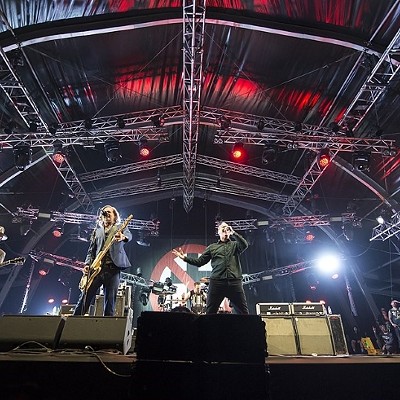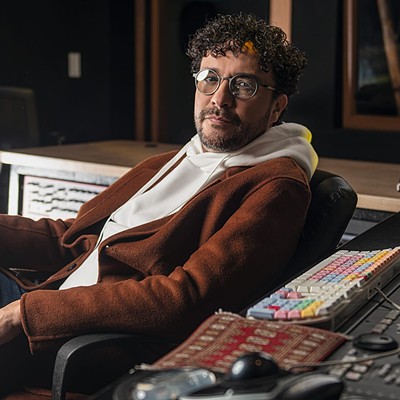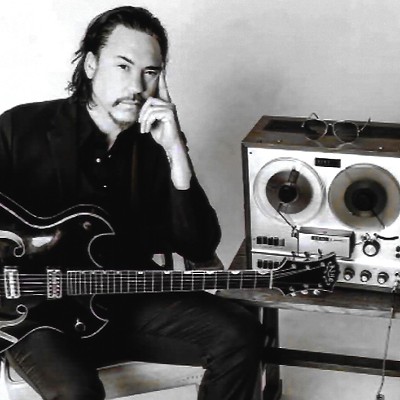Bob Dorough is the kind of musician who when he's performing in the area, someone makes sure to call the local newspaper and tell them about it. In this case the man who made the phone call was Houston jazz producer Joe Peine. (Thanks, Joe.)
Perhaps best-known for the insouciant jazz standard "Devil May Care," originally released in 1956 and since covered by Miles Davis, Diana Krall and Jaime Cullum, among others, Dorough went on to a long and distinguished career as a vocalist, pianist, producer arranger and educator, brushing up against some of the most interesting characters in '50s and '60s pop culture along the way: Davis, Lenny Bruce, Allen Ginsberg, '60s weirdo rockers the Fugs.
Born in Arkansas, educated in Texas (including the famous University of North Texas jazz program in its infancy), Dorough plays East End Cafe Bohemeo's Sunday in a rare booking. But it's not all that unusual for the Arkansas-born musician, 88, to be in Houston.
His daughter Aralee has been the Houston Symphony's principal flautist for more than 20 years, while her dad has recently been in town recording the soundtrack to the upcoming film Eulalia with an all-star cast of Houston jazz cats including Phil Woods, Herman Matthews and Dennis Dotson.
You might recognize Dorough for one other thing, but we'll get to that a little later. First he reflected over his career with Rocks Off last week from his home in Eastern Pennsylvania, where he spends his time assisting the next generation of jazz musicians -- another album, of duets with several products of that Poconos scene, will also be out in a few months.
"We've got a real hot community out here, a lot of jazz musicians," Dorough says. "We breed them here."
Rocks Off: Was it ever strange for you as a jazz guy to have a daughter as the principal flautist for the Houston Symphony?
Bob Dorough: (Laughs) Well, no. I actually majored in composition. I know a lot about classical music, it's just that I played the other kind. She grew up in my home, so she was getting experience doing little concerts with me. She went to Oberlin, so of course I was right behind her all the way.
RO: Was North Texas as good of a jazz school back then as it is today?
BD: Well, no, it wasn't as developed. The program was actually instigated while I was there. I wasn't a jazz major, I was a composition major. I took part in the rehearsals and wrote charts for the band.
That was the beginning of it, but there were a lot of young jazzmen trying to play the new style, bebop. North Texas was pretty hot (laughs). Now jazz education has swept all over the world.
RO: When did you know you wanted to be a jazz player?
BD: I fell in love with music playing in the high school band, where I played the clarinet. The band director was a talented gentleman, and he gave me harmony lessons. Actually, he frowned on jazz; he liked the real, legitimate clarinet tone, but me and the drummer said, "let's start a band," so we had a sort of underground jazz band in Plainview. It was pretty bad and amateurish.
Then when I went to Lubbock, there was some good jazz players there. I was fortunate enough to be in a special services Army band during my three years in the Army, where we had Northern musicians as well as Southern musicians. We just all sort of flipped out over Charlie Parker and Dizzy Gillespie.
RO: And then what was your big break in the music business?
BD: (laughs) That took quite a while. As the years went by, I was coaching singers at North Texas and I liked the idea that I would be singing their song just to show them how it would go, just swing it. I thought, "Gee, I could do that myself" and became more interested in the art of jazz vocals. It made sense to accompany myself on piano, so I began to write songs.
I'd say my first real triumph was having a song called "Devil May Care," which was recorded by Les Elgart. It's a joke I use with my wife -- "that crook, he never paid me." Financially it wasn't big, but just to get a song recorded like that was great.
I began to pay a little more attention to songwriting and singing as well as still loving to play bebop piano.
RO: I was reading about this thing called "vocalese." Would you mind explaining exactly what that is and how you started doing it?
BD: Actually I think "vocalese" is a misnomer because Villa-Lobos, the great composer, wrote a piece where the soprano singer was singing but she had no words [vocalizes], a beautiful melody without words. He called it "vocalese."
Now, decades later, someone used it to signify the taking of a jazz record that's already recorded and putting words to it. Of course you put words to the melody or the riff that they'd play first, but then they'd put lyrics to the improvisation as it was recorded.
RO: How does that work? Where do you get the words from?
BD: Well, your imagination (chuckles). Let's say you fall in love with a melody and you start singing it, and suddenly it becomes... you get an idea. When I wrote "Yardbird Suite," I was occupied three months. Night and day, wherever I went traveling around New York City, I was juggling and jiggling the lines to make it fit.
First you have to memorize the jazz solo as it's played on the recording so you can put the lyrics to it. That becomes what you're working against - making they lyrics fit and still make sense.






